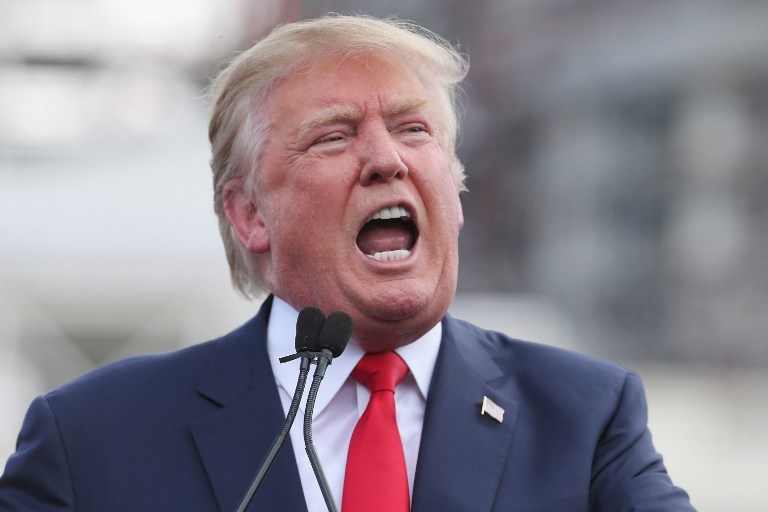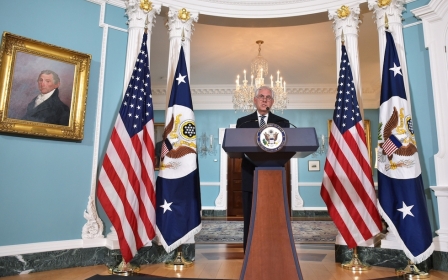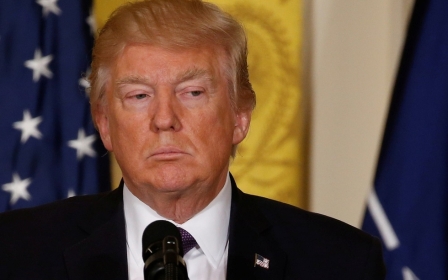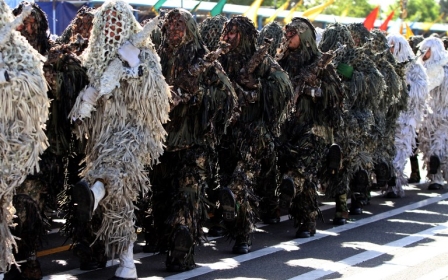Iran: Trump’s punching bag

After fewer than 100 days in office, several of President Donald Trump’s manoeuvrings that seemed crucial to satisfy his political base have thus far failed, and in embarrassing ways.
First, the two executive orders that he issued regarding the travel ban on the citizens of several Muslim countries were blocked by restraining orders issued by several judges. Then came his embarrassing failure to produce on his central campaign promise of repealing and replacing Obamacare.
If Trump is not ready for a war then he is not ready for the collapse of the nuclear deal which will inevitably lead to a military confrontation between Iran and the US
Those losses have damaged the tough and decisive image that he tried to portray throughout his campaign and, over time, could significantly affect his political base. Any more failures like that will threaten the early momentum of his presidency. Right about now, Trump sorely needs a political win.
Towards that end, Trump and his administration are weighing an action that can appear bold and face little, if any, resistance within the establishment and, therefore, result in an easy win. Choosing Iran as a punching bag will do just the trick.
‘The not-too-distant future’
There is a large consensus within the US establishment, among Republicans and Democrats alike, that a tough stance on Iran should be adopted and, in recent days, Trump and his administration have started to orchestrate their move against the country.
In an 18 April letter to Congress, US Secretary of State Rex Tillerson said, “Iran remains a leading state sponsor of terror, through many platforms and methods. President Donald J Trump has directed a National Security Council-led interagency review of the [nuclear deal] that will evaluate whether suspension of sanctions related to Iran pursuant to the [nuclear deal] is vital to the national security interests of the United States.”
Iran will not dismantle its nuclear programme under even the most extensive US sanctions and military threats
A day later, Tillerson said the administration would look at the US policy toward Iran as a whole, including not just Tehran’s compliance with the nuclear deal, but also its destabilising actions in the Middle East.
When asked if the US should rescind the nuclear deal, Tillerson said, “We just don’t see that that’s a prudent way to be dealing with Iran, certainly not in the context of all of their other disruptive activities.”
During a 20 April news conference, Trump said, “[Iranians] are not living up to the spirit of the [nuclear] agreement. . . . And we’re analysing it very, very carefully and we’ll have something to say about it in the not-too-distant future.”
On a visit to Saudi Arabia earlier this month, US Secretary of Defense Jim Mattis matched Tillerson and Trump’s position toward Tehran, saying, “Everywhere you look, if there is trouble in the region, you find Iran.”
Threaten and bully
The goal of the likely re-introduction of paralysing sanctions on Iran could be either to force Iran to dismantle its nuclear programme or the overthrow of the country’s political system in its entirety, a goal which six US presidents have failed to accomplish.
Trump apparently believes that tough sanctions are capable of bringing Iran’s system down. In February, he tweeted, “Iran was on its last legs and ready to collapse until the US came along and gave it a lifeline in the form of the Iran deal: $150 billion.”
But his logic is flawed on two counts.
First, Iran will not dismantle its nuclear programme under even the most extensive US sanctions and military threats. That is because Iranian leaders, as repeatedly emphasised by high-ranking officials from the supreme leader down, firmly believe that as soon as the US determines that sanctions and threats work, they would question and clamp down on everything from Iran’s human rights issues to its alleged sponsorship of terrorism in pursuit of the capstone achievement - toppling the regime.
Ayatollah Khamenei has repeatedly said: “If the officials of a country get daunted by the bullying of the arrogant powers and, as a result, begin to retreat … they [arrogant powers] will never stop obtaining concessions from you through pressure and intimidation.” To Khamenei, this would lead to “the United States bringing to power in this country whoever it wants!”
In a 19 April statement, Khamenei said: “The invasive superpowers’ techniques are to threaten and bully. We have reiterated this fact several times. … The worst situation for a country is when the officials fear the enemy’s threats and bullying techniques. If they fear them, they have actually opened up a way for the enemy’s invasion and aggression.”
Just look at recent precedent: during George W Bush’s presidency, the two countries were a short distance away from a war and under Obama’s presidency, Israel continuously threatened and decided to attack Iran three times. Yet Iran never gave up its nuclear programme.
Ready for war?
Second, if Trump is not ready for a war – and one which would not be contained within Iran’s borders – then he is not ready for the collapse of the nuclear deal which will inevitably lead to a military confrontation between Iran and the United States. If Trump thinks otherwise, he is as wrong as Khamenei.
If, after so many years of hardship and insistence on building a full-cycle nuclear programme despite tremendous financial costs and worldwide sanctions, the Iranian leadership backed down on the nuclear issue now, the Iranian deep state would incur high political costs. Such costs would fall primarily on the leader, who has constantly linked the nuclear programme to the notion of national pride.
So if the US voids the deal, Iranian radicals would completely push the moderates to the margin and respond to US sanctions by expanding Iran’s nuclear programme to perilous limits, as they did during Obama’s tenure. That would leave the Trump administration with no alternative short of war.
'The fantasy, the naiveté, the optimism, is to think that we reject this deal and somehow it all solves itself with a couple of missile strikes - that is not sound foreign policy'
Barack Obama
Some argue that it was the pressure caused by the sanctions that finally brought the Iranians to the negotiating table. What such observers miss, however, is that the momentum around the negotiations that led to the historic 2015 nuclear deal between Iran and six world powers only took off after then-US deputy secretary of state William Burns, during secret meetings in Oman in 2013, told his Iranian counterparts that the US was prepared to abandon its decade-old policy of “zero uranium enrichment” in Iran.
President Obama had a respectable vision about the consequences of a tit-for-tat policy regarding Iran’s nuclear crisis. In a 2015 speech, he said: “Congressional rejection of this deal leaves any US administration that is absolutely committed to preventing Iran from getting a nuclear weapon with one option, another war in the Middle East. I say this not to be provocative, I am stating a fact.
"Without this deal, Iran will be in a position, however tough our rhetoric may be, to steadily advance its capabilities. Its breakout time, which is already fairly small, could shrink to near zero. Does anyone really doubt that the same voices now raised against this deal will be demanding that whoever is president bomb those nuclear facilities?”
He added, “The fantasy, the naiveté, the optimism, is to think that we reject this deal and somehow it all solves itself with a couple of missile strikes - that is not sound foreign policy.”
- Shahir Shahidsaless is an Iranian-Canadian political analyst and freelance journalist writing about Iranian domestic and foreign affairs, the Middle East and US foreign policy in the region. He is the co-author of Iran and the United States: An Insider’s View on the Failed Past and the Road to Peace. He is a contributor to several websites with focus on the Middle East as well as the Huffington Post. He also regularly writes for BBC Persian. You can reach him at [email protected] or follow him on Twitter @SShahisaless.
The views expressed in this article belong to the author and do not necessarily reflect the editorial policy of Middle East Eye.
Photo: Then Republican presidential candidate Donald Trump addresses a rally against the Iran nuclear deal on the West Lawn of the US Capitol on 9 September 2015 in Washington, DC (AFP)
New MEE newsletter: Jerusalem Dispatch
Sign up to get the latest insights and analysis on Israel-Palestine, alongside Turkey Unpacked and other MEE newsletters
Middle East Eye delivers independent and unrivalled coverage and analysis of the Middle East, North Africa and beyond. To learn more about republishing this content and the associated fees, please fill out this form. More about MEE can be found here.





